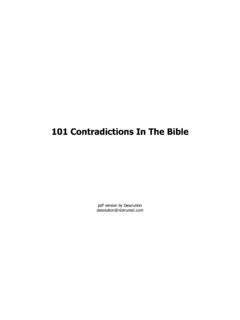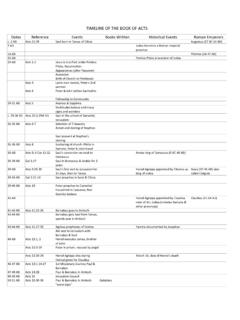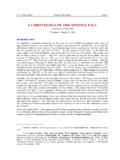Transcription of The Wiersbe Bible Commentary
1 Warren W. WiersbeNTthe completenew testamentin one volumeThe Wiersbe BibleCommentaryOUTLINEKey theme:The righteousness of God Key verse:Romans 1:17 CONTENTSROMANSM atthewMarkLukeJohnActsRomans1 Corinthians2 CorinthiansGalatiansEphesiansPhilippians Colossians1 Thessalonians2 Thessalonians1 Timothy2 TimothyTitusPhilemonHebrewsJames1 Peter2 Peter1 John2 John3 JohnJudeRevelationI. INTRODUCTION (1:1 17)II. SIN RIGHTEOUSNESS DEMANDED (1:18 3:20)A. The Gentiles guilty 1:18 32B. The Jews guilty 2:1 3:8C. The whole world guilty 3:9 20 III. SALVATION RIGHTEOUSNESS DECLARED(3:21 5:21)A. Justification stated 3:21 31 B. Justification illustrated in Abraham 4 C. Justification explained in Adam 5IV. SANCTIFICATION RIGHTEOUSNESSDEFENDED (6 8)A. Victory the flesh 6 B. Liberty the Law 7 C. Security the Spirit 8V. SOVEREIGNTY RIGHTEOUSNESS DECLINED(9 11)A. Israel s past riches 9B.
2 Israel s present rejection 10C. Israel s future restoration 11VI. SERVICE RIGHTEOUSNESS DEMONSTRATED(12:1 15:7)A. In the church body 12 B. In society 13C. Toward the weaker believer 14:1 15:7 VII. CONCLUSION (15:8 16:27)Romans 1:1 17410 Ready for RomeRomans 1:18 3:20413 When God Gives UpRomans 3:21 4:25416 Father AbrahamRomans 5419 Live Like a King!Romans 6423 Dying to LiveRomans 7425 Christians and the LawRomans 8429 Freedom and FulfillmentRomans 9432 Did God Make a Mistake?Romans 10435 The Wrong RighteousnessRomans 11438 God Is Not Through With Israel!Romans 12 13441 Right Relationships Mean Right LivingRomans 14:1 15:7444 When Christians DisagreeRomans 15:8 16:27448 Man on the (1:1 17)CHAPTER ONER omans 1:1 17 READY FOR ROMEOn May 24, 1738, a discouraged missionary went very unwillingly to a religious meeting inLondon. There a miracle took place.
3 About aquarter before nine, he wrote in his journal, I felt myheart strangely warmed. I felt I did trust in Christ,Christ alone, for salvation; and an assurance was givenme that He had taken away my sins, even mine, andsaved me from the law of sin and death. That missionary was John Wesley. The message heheard that evening was the preface to Martin Luther scommentary on Romans. Just a few months before,John Wesley had written in his journal: I went toAmerica to convert the Indians; but Oh! who shall con-vert me? That evening in Aldersgate Street, hisquestion was answered. And the result was the greatWesleyan Revival that swept England and transformedthe s epistle to the Romans is still transformingpeople s lives, just the way it transformed MartinLuther and John Wesley. The one Scripture above allothers that brought Luther out of mere religion intothe joy of salvation by grace, through faith, wasRomans 1:17: The just shall live by faith.
4 TheProtestant Reformation and the Wesleyan Revival wereboth the fruit of this wonderful letter written by Paulfrom Corinth about the year AD 56. The letter wascarried to the Christians at Rome by one of the dea-conesses of the church at Cenchrea, Sister Phebe ( :1).Imagine! You and I can read and study the sameinspired letter that brought life and power to Lutherand Wesley! And the same Holy Spirit who taughtthem can teach us! You and I can experience revival inour hearts, homes, and churches if the message of thisletter grips us as it has gripped men of faith in the opening verses of the letter, Paul introduceshimself to the believers in Rome. Some of them musthave known him personally, since he greets them in thefinal chapter, but many of them he had never met. So,in these first seventeen verses, Paul seeks to link himselfto his Roman readers in three Presented His Credentials (1:1 7)In ancient days, the writer of a letter always openedwith his name.
5 But there would be many men namedPaul in that day, so the writer had to further identifyhimself and convince the readers that he had a right tosend the letter. What were Paul s credentials?He was a servant of Jesus Christ (v. 1a). Theword Paul used for servantwould be meaningful to theRomans, because it is the word were anestimated sixty million slaves in the Roman Empire,and a slave was looked on as a piece of property, not aperson. In loving devotion, Paul had enslaved himselfto Christ, to be His servant and obey His was an apostle (v. 1b). This word means onewho is sent by authority with a commission. It wasapplied in that day to the representatives of theemperor or the emissaries of a king. One of the require-ments for an apostle was the experience of seeing therisen Christ (1 Cor.)
6 9:1 2). Paul saw Christ when hewas on the road to damascus (Acts 9:1 9), and it wasthen that Christ called him to be His apostle to theGentiles. Paul received from Christ divine revelationsthat he was to share with the was a preacher of the gospel (vv. 1c 4).When he was a Jewish rabbi, Paul was separated as aPharisee to the laws and traditions of the Jews. Butwhen he yielded to Christ, he was separated to thegospel and its ministry. Gospelmeans the good news. It is the message that Christ died for our sins, wasburied and rose again, and now is able to save all whotrust Him (1 Cor. 15:1 4). It is the gospel of God (Rom. 1:1) because it originates with God; it was notinvented by man. It is the gospel of Christ ( :16) because it centers in Christ, the Savior. Paul alsocalls it the gospel of his Son (Rom.
7 1:9), which indi-cates thatJesus Christ is God! In Romans 16:25 26,Paul called it my gospel. By this he meant the specialemphasis he gave in his ministry to the doctrine of thechurch and the place of the Gentiles in the plan gospel is not a new message; it was promised inthe Old Testament, beginning in Genesis 3:15. Theprophet Isaiah certainly preached the gospel in passagessuch as Isaiah 1:18, and chapters 53 and 55. The salva-tion we enjoy today was promised by the prophets,though they did not fully understand all that they werepreaching and writing (1 Peter 1:10 12).Jesus Christ is the center of the gospel message. Paulidentified Him as a man, a Jew, and the Son of was born of a virgin (Isa. 7:14; Matt. 1:18 25) intothe family of David, which gave Him the right toDavid s throne. He died for the sins of the world, andthen was raised from the dead.
8 It is this miraculousevent of substitutionary death and victorious resurrec-tion that constitutes the gospel, and it was this gospelthat Paul was a missionary to the Gentiles (vv. 5 7).Missionaryis the Latin form of apostle one who issent. There were probably several assemblies of believ-ers in Rome and not just one church, since in Romans16 Paul greets a number of home church groups(Rom. 16:5, 10 11, 14). We do not know for certainhow these churches began, but it is likely that believersfrom Rome who were at Pentecost established theassemblies on their return to Rome (Acts 2:10). Therewere both Jews and Gentiles in these fellowships,because Paul addresses both in this letter. (Jews: :17 29; 4:1; 7:1. Gentiles: Rom. 1:13; 11:13 24;15:15 21.) The churches in Rome were not foundedRomans 1410by Peter or any other apostle.
9 If they had been, Paulwould not have planned to visit Rome, because his pol-icy was to minister only where no other apostle hadgone (Rom. 15:20 21).Note the repetition of the word called:Paul wascalled to be an apostle; the believers were the called ofJesus Christ; and they were also called saints. (Not tobe saints; they already were saints! A saint is a set-apartone, and the person who trusts Jesus Christ is set apartand is a saint.) Salvation is not something that we dofor God; it is God who calls us in His grace (2 :13 14). When you trust Christ, you are saved by Hisgrace and you experience His s special commission was to take the gospel tothe Gentiles (the word nations means Gentiles), andthis is why he was planning to go to Rome, the verycapital of the empire. He was a preacher of the gospel,and the gospel was for all nations.
10 In fact, Paul was anx-ious to go to Spain with the message of Christ ( :28).Having presented his credentials, Paul proceeded toforge a second link between himself and the believers Expressed His Concern (1:8 15)We can well understand Paul s concern for the churchesthat hefounded, but why would he be concerned aboutthe believers at Rome? He was unknown to many ofthem, yet he wanted to assure them that he was deeplyconcerned about their welfare. Note the evidences ofPaul s was thankful for them (v. 8). The wholeworld meaning the whole Roman Empire knew ofthe faith of the Christians at Rome. Travel was rela-tively common in that day and all roads led to Rome. It is no wonder that the testimony of the church spreadabroad, and this growing witness made Paul s ministryeasier as he went from place to place and was able topoint to this testimony going out from the heart of theRoman prayed for them (vv.)





